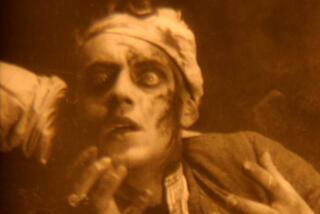A World Too Intoxicated by the Wine of War
- Share via
What is it about this country and war? And by extension, about civilization and war, that devilish oxymoron that shadows us, generation after generation, century upon century?
“Compared to war,” said George S. Patton Jr., “all other forms of human endeavor shrink to insignificance.” The old general probably gave as much thought to the subject as anyone--and got closer to expressing its essence than most.
War gives purpose to life. With risk comes vitality.
An unsettling idea, yes. But that’s what I’ve observed. I’ve been in war once in uniform and eight times as a journalist. In war, everyone has a purpose--inflicting violence and trying to survive. The trivial fades. War even energizes those who are committed to resisting war.
Peace brings out the silliness in man; war makes him imitate the tiger.
Shakespeare said that.
The purpose of life is not always noble. But war is always conceived as a noble endeavor, isn’t it? War is righteous: in destruction, renewal.
The young men of war hate war, or so they claim. Then they grow old and oversee the next war. The young of the Civil War were the administrators of the Spanish-American War. The youth of that war managed World War I, in which the generals of World War II were seasoned. The boys of World War II pursued Vietnam. The youth of Vietnam lead the country into battle now.
In a dispatch from Tunisia after America’s first big campaign against the Nazis in World War II, the most widely read newspaper correspondent of his age, Ernie Pyle, wrote what few want to admit: “It would be wrong to say that war is all grim; if it were, the human spirit could not survive ... war is vastly exhilarating. The whole tempo of life steps up, both at home and on the front. There is an intoxication about battle, and ordinary men can sometimes soar clear out of themselves on the wine of danger-emotion.”
Change the context. Run those thoughts through the mind of a 25-year-old man in the ruins of Afghanistan. What are his choices? Squalor and hunger? Or to follow the warriors in the mountains? The “world was changed” on Sept. 11. Imagine the intoxicating wine of that idea for a man with nothing. He could change the world! Anger is the cheapest escape.
But let’s ponder something else that Pyle wrote as Allied forces approached Germany and the end of Hitler: “We did not win because destiny created us better than all other peoples.” Avoiding another war, he said, will depend on the wisdom of the victors to create a world that is “fair.”
For a time back then, the United States assumed a responsibility beyond winning.
As Napoleon said: “If they want peace, nations should avoid the pinpricks that precede cannon shots.” This time, the pinpricks have been many.
A proverb: It is better to keep the peace than make peace.
Peace, though, requires the agreement of two. War arises from the resolve of only one.
In a time capsule sealed at the World’s Fair in 1939, Albert Einstein wrote enthusiastically about the coming age of technology and its promise for better living. “However,” he cautioned, “the production and distribution of commodities is entirely unorganized so that everybody must live in fear of being eliminated from the economic cycle.... Furthermore, people living in different countries kill each other at irregular time intervals, so that also for this reason anyone who thinks about the future must live in fear and terror.”
He ended on a hopeful note: “I trust that posterity will read these statements with a feeling of proud and justified superiority.”
Not just yet, doctor.
For now, we go to war again. As Caesar said at the crossing of the Rubicon, “The die is cast.”
This is a different kind of war, a 21st century war, we’re told. Yes, because you or I or any of us may be next on the front lines. The battle may rage in Kabul or in Bakersfield.
“Once more unto the breach, dear friends. Once more.”
Shakespeare said that too.
More to Read
Sign up for Essential California
The most important California stories and recommendations in your inbox every morning.
You may occasionally receive promotional content from the Los Angeles Times.










